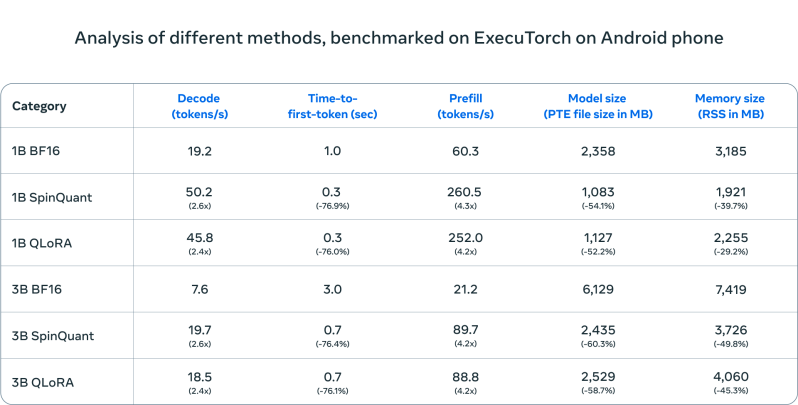Meta Platforms has introduced smaller versions of its Llama AI models that can now run on smartphones and tablets. The new Llama 3.2 1B and 3B models are designed to be faster and more memory-efficient than their larger counterparts, using a technique called quantization. This breakthrough allows advanced AI capabilities on personal devices, reducing reliance on large data centers. In tests on Android phones, the compressed models showed impressive speed and reduced memory usage. Meta’s move challenges the dominance of other tech giants like Google and Apple, promoting open-source development and making it easier for developers to create AI applications for a wider range of devices. This shift could change how we interact with AI on our phones, bringing intelligence right into our pockets.
Meta Platforms has just unveiled new, smaller versions of its Llama artificial intelligence models that can run directly on smartphones and tablets. This opens exciting possibilities for using AI conveniently without needing massive data centers.
The latest models, Llama 3.2 1B and 3B, are designed to be more efficient, running up to four times faster while consuming less than half the memory compared to previous versions. According to Meta’s testing, these smaller models deliver performance that is almost on par with their larger counterparts.
The technology behind this advancement is called quantization, which simplifies the complex math that powers AI. Meta employed two specific techniques together: Quantization-Aware Training with LoRA adaptors (QLoRA) to keep accuracy intact, and SpinQuant to enhance portability.
This breakthrough means that sophisticated AI can now function without needing large computing resources. Tests on the OnePlus 12 Android phone showed these compressed models are 56% smaller and use 41% less memory while processing text significantly faster. They can handle up to 8,000 characters, making them suitable for most mobile applications.
Meta’s move intensifies the competition among major tech companies to shape the future of AI on mobile devices. While Google and Apple have focused on tightly controlled, integrated approaches, Meta is taking a more open route. By collaborating with chip makers like Qualcomm and MediaTek, Meta allows developers to create AI apps independently, without relying on the updates from Google or Apple, reminiscent of the early days of mobile app development.
The dual distribution of these models via Meta’s Llama website and the Hugging Face platform shows their commitment to developers. This strategy could position Meta’s models as essential tools for mobile AI, similar to how TensorFlow and PyTorch are viewed in machine learning.
As AI shifts from centralized systems to personal devices, Meta’s announcement points to a significant transition where smartphones can quickly and privately handle complex tasks. This is timely, as there is growing scrutiny over data privacy and AI ethics. With the ability to perform tasks like document summarization directly on phones, users may enjoy more control over their sensitive information.
However, success will depend on the availability of powerful smartphones and how developers balance the trade-off between privacy and cloud computing capabilities. Competing companies, especially Apple and Google, also have distinct plans for integrating AI into mobile experiences.
In summary, AI technology is evolving to operate outside data centers, making it more accessible for everyday mobile use. As we move forward, it is clear that AI is making its way into our pockets, one smartphone at a time.
tags: AI, Meta, Llama Models, smartphones, mobile technology, data privacy, tech competition, app development, AI on mobile
-
What does Meta’s new AI do for phones?
Meta’s new AI helps your phone understand you better, making it easier to get things done, like answering questions and managing tasks. -
How is this AI different from Google or Apple’s?
Meta’s AI is designed to be more personalized and responsive, focusing on making daily tasks simpler and more efficient. -
When will this AI be available on my phone?
Meta plans to roll out this AI feature in the coming months, so stay tuned for updates from your phone manufacturer. -
Will this new AI protect my privacy?
Yes, Meta emphasizes user privacy and says that your data will be kept secure while using their AI features. - Can I turn off the AI if I don’t like it?
Absolutely! You can turn off the AI at any time if it doesn’t suit your needs.






